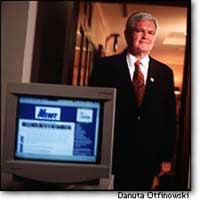5e. The Internet in Politics
Not since television has an innovation had the potential to impact politics greater than the Internet. With more and more Americans getting wired, the ability to reach millions of voters will be a lure which no politician can resist.
In the year 2000, the Internet has not eclipsed the influence of newspapers, radio, or television. However, cyberspace has an advantage over the older news sources. The Internet is an interactive medium, allowing citizens to send information as well as receive it — in real time.

Former Speaker of the House, Newt Gingrich, actively supported the Internet since the early 80s. He spearheaded congressional bills that placed the Internet in schools, homes, and businesses across the country.
In 1996, all major presidential candidates developed websites to support their campaigns. Newsgroups have been created to cover the entire political spectrum. Interest groups have reached new audiences on the World Wide Web, creating the potential for an even greater influence in Washington. Fringe organizations on the far left and the far right have used the relatively unregulated medium — free from profit motive or government control — to broaden the support networks.
| Voting via the Internet has been tested and used in elections across the country during the November 2000 election. Proponents say that such a method will increase voter participation by making it easier, faster, and more accessible to vote. Opponents of Internet voting say that it is too easy to tamper with, and disenfranchises lower-income voters who do not have computer access. |
Given its interactive capabilities, why not let citizens vote directly online? Two states already experimented with this in the presidential primaries in the 2000 contest. A voter could register online, and later cast his or her vote into cyberspace.
The original idea of direct democracy was to let all citizens vote on all issues. With a nation as large as the United States, it became unfeasible to assemble the citizenry for such direct involvement to take place. The Internet could turn that impossibility into a reality. Rather than letting the Senate and House of Representatives to vote on an issue, why not create a national referendum and permit Americans to voice their opinions in an online vote? Supporters and opponents of a bill could post information pertinent to the issue on a web page. Debate could take place informally in chat rooms. Optimists point to the potential of the Internet to create a more democratic America.
Use of the Internet in this fashion has critics as well. Fears of a malicious hacker breaking into a voting site and shutting it down or tampering with the results have led most states to proceed cautiously. A technological gap still exists between connected Americans and those without the financial means to own a computer or pay for Internet service.
Some intellectuals question the expertise of the average American to cast important votes on policy matters. Until these questions get resolved, the use of the Internet in the political arena remains mostly potential. But at the dawn of the 21st century, even the naysayers see the revolutionary changes on the horizon introduced by this exciting new medium.
Regardless, the Internet is already a powerful tool for delving into political issues and delving into the history of the United States. After all, it is the medium you are currently using.






